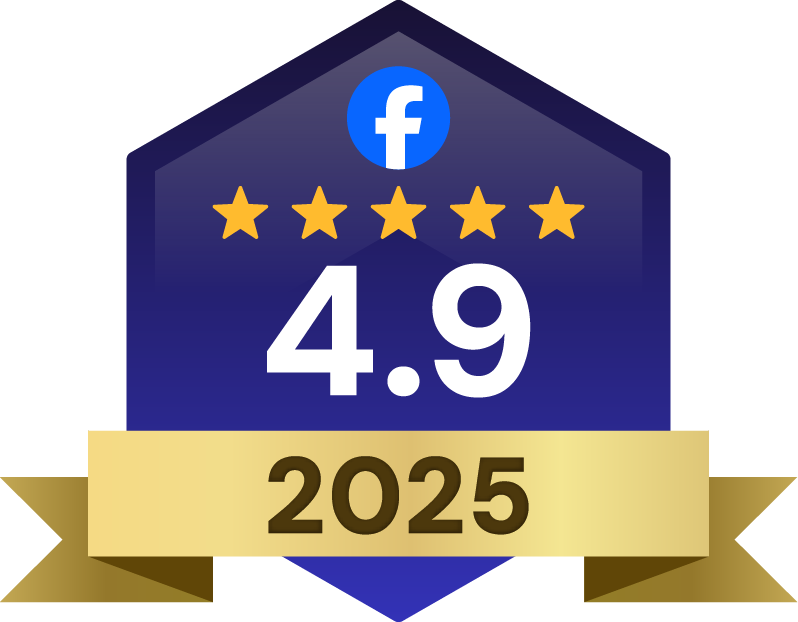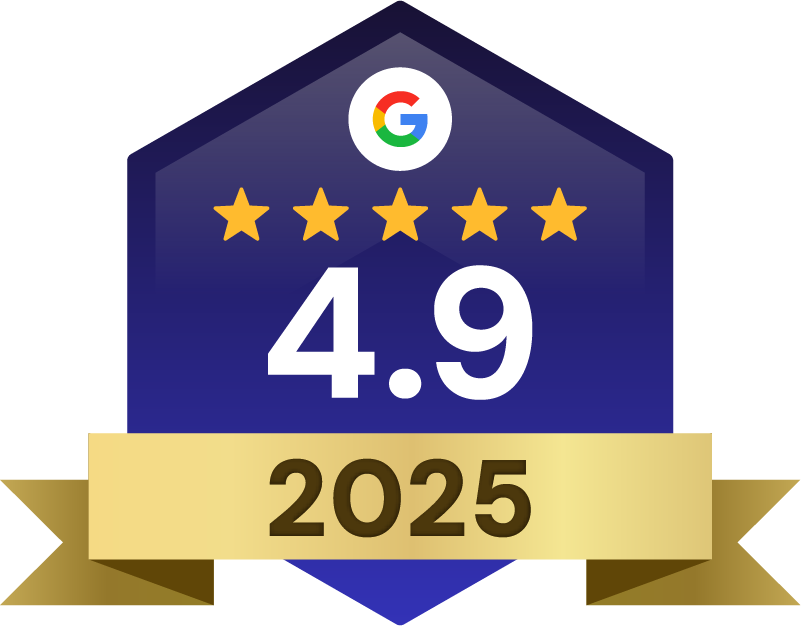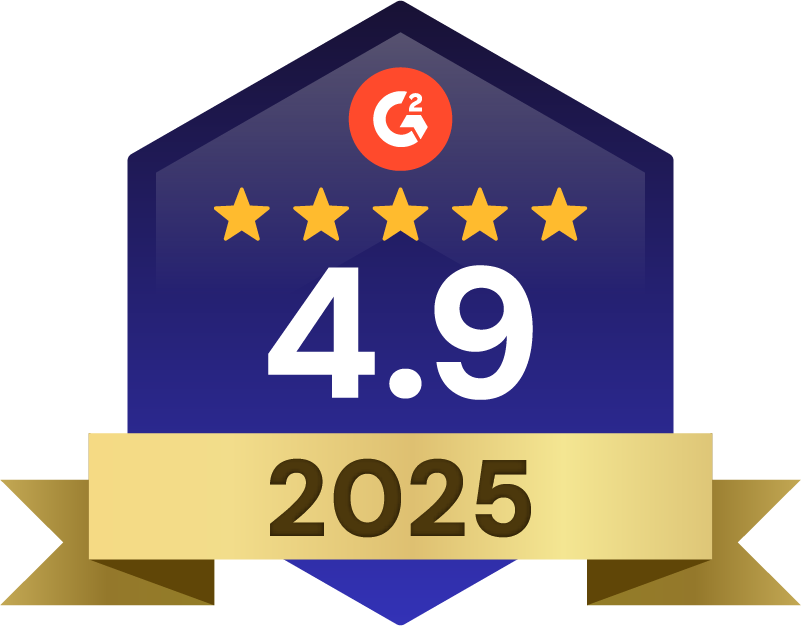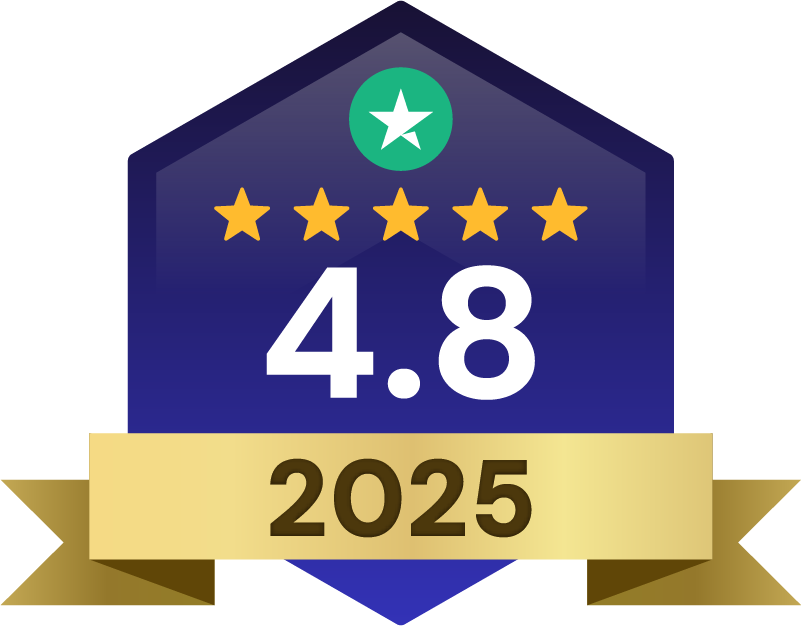Learn how AI tools can transform your real estate marketing in 2025, boosting lead generation and client engagement.
Branding & Design Technology
AI is already a well-utilized tool in real estate digital technology. In the last decade, artificial intelligence has been gradually introduced into each step of the property buying process. Nowadays, it’s so ubiquitous that we often forget when we are relying on and engaging with AI in our businesses.
The core of artificial intelligence is about boosting efficiency through automating tasks and quickly making decisions about massive amounts of data. The World Economic Forum has predicted that by 2025 AI will take over roughly 85 million jobs and create 97 million new ones. That’s no small feat.
The remarkable benefits of AI in real estate are vast and varied: 24/7 chat boxes, automated workflow, and error correction are just scratching the surface. We’ll dive deeper into the various benefits and uses of AI in real estate to better understand how AI is shifting the industry completely.
How Does Artificial Intelligence Work?
To understand AI you have to first understand deep learning and natural language processing. Deep learning is a subfield of machine learning that is defined by its ability to replicate human thought and habits in order to perform tasks in a “human” way. Natural language processing enables computers to understand and replicate every facet of human language including tone, syntax, cadence, grammar, and more.
If you’ve found your way on to this webpage, you’ve definitely interacted with AI along your journey. Virtual assistants, social feeds, and the facial recognition on your iPhone are all examples of deep learning in our day to day lives.
The Barrier of AI Inaccuracy
The main challenge with AI content creation is that available data sources are often not diverse enough or even inaccurate. For instance, home buyer data that reflects existing underlying social economical and racial biases can skew the results of an AI generated market report. AI tools scan datasets from the area including crime statistics, tenant information, lease agreements, businesses nearby, home sales per year and more to predict future market trends.
However, as AI increases in use and popularity, advanced data mining techniques can assist in beating data scarcity. It’s imperative for humans to always have the option to override AI when necessary and use tools within reason.
Customized Artificial Intelligence Tools for AgentFire Clients
Our team has developed a new AI too made specifically around our client’s needs and real estate goals. Instead of you having to integrate a completely new application that requires a handful of resources and set up costs, we’ve developed technology that is already integrated with your real estate website and available to every member of your team as your business expands.
How is AI Used By Real Estate Agents and Brokerages?
According to Medium, the core of AI works to assist with or complete specific elements of the home-buying process that are so tedious, no agent wants to take them on themselves. Most real estate AI tool solve one or many of the following basic functions:
- Predict: Use historical data to prepare for the future.
- Identify: Find gaps in information.
- Perceive: Simplify unstructured, complex data.
- Extract: Highlight underlying patterns in data points.
- Optimize: Simplify processes to save time and energy.
There are a few specific AI-based tools that have gained tons of traction in the real estate industry. The way we use these tools day-to-day can give us a good idea of where they’re headed next.
Chatbots
Chatbots act as a bridge between a client and an agent when the agent isn’t available to speak one-on-one. Clients can get answers to common questions at any time of the day, whether or not an agent is available. Chatbots can also assist brokerages in marketing listings with speed and precision, along with many customizable functions. Some chatbots are even advanced enough to switch between a bot to a human on-demand when complex questions are brought up.
Neighborhood Info
Most buyers see a new home as a massive investment. Having a reliable forecast of your hyperlocal market’s future can help your clients feel much more confident about their decision. As we’ve mentioned earlier, AI can’t always accurately predict future market changes. However, it can give a general idea of what to expect. Future rent, home value, anomalies, and selling prices, can be researched as far back as 50 years ago to give clients the best overview available at a specific moment in time. A reliable prediction of its value can also reveal whether or not they are ready to make such a major purchase.
Home Search
From the client’s perspective, accurate home searches are one of the most impactful AI advancements. Deep learning has made the online home search process less frustrating and confusing by analyzing a prospect’s search habits to select and present listings they are most likely to be interested in.
Scheduling
AI can take on the constant attention and coordination that scheduling normally requires. With a scheduling integration on your website, there’s no need for an assistant to manage phone calls and manually type in meetings. Clients book meetings straight from your webpage and are sent updates if the meeting has been changed or is approaching.
Our AgentFire Calendy add on is the most advanced online scheduling technology available to agents now. With your Calendy integration, clients can book calls, meetings, showings and more, as soon as you set your availability.
Virtual Tours
In many situations, artificial intelligence helps us adapt to sudden changes in the real estate industry and our daily lives. As the Covid-19 pandemic halted movement across the world, the real estate industry was forced to adapt to AI in order to stay in business. Virtual tours and video tours were one of the most beneficial tech introductions. In fact, they were so successful that they’re still being used after the pandemic was under control.
Clients enjoy 3D views of properties with a few clicks and without leaving their homes. It’s easy to zoom in, read notes about the property, experience panoramic views of the home, view the space multiple times…
Artificial intelligence also improves in-person virtual tours. Translator apps can help clients who may not speak the same first language as their agent.
AI Content Writing
New content writing technology uses artificial and machine learning to predict your natural writing style. Tools like Jasper will provide different writing suggestions depending on the type of content you’re writing. With multiple templates, it’s easy to write content that is optimized for your audience and specific needs.
Real time Tracking
AI web solutions keep track of a customer’s online searches, time on each of your webpages, previous page views and purchases, and other detailed information that can lend a huge advantage to real estate businesses that use these tools.
Lead Generation
Lead generation is the life source of any real estate business. AI tools can help real estate professionals identify and attract potential clients from social media, web pages, and other online pages without your intervention. With AI taking over some of the lead generation responsibilities, agents have more time to invest in the most qualified leads and focus on creating sales.

How is AI Being Used by Real Estate MarketPlace Sites: Zillow and Trulia
Consumer Preferences
AI is the backbone of many real estate giants like Zillow and Trulia. These real estate marketplaces use AI to better understand consumer preferences by analyzing past data. In order to map consumer choices, AI extracts extremely detailed data such as proximity to Starbucks, local business reviews, choices similar buyers have made, and how much was paid for properties of interest.
Zestimate is the Zillow-built technology that uses a neural network (technology designed to map information similar to the brain) to quickly gather information such as transactions, public records, square footage and more. These hundreds of rich data points inform Zestimate about who is a hot lead and what that lead is looking for.
Buying and Selling
Some online real estate marketplaces have taken a greater leap into automation by absorbing several or all of the responsibilities of a real estate agent. Take Opendoor, for example.
Opendoor is a real estate service that uses AI to buy, find, and sell houses directly through its online platform with all-cash offers. Everything from processing the transaction to managing walk-throughs happens through Opendoor. With the Opendoor app, home buyers can instantly unlock properties and take a self-guided tour. If they find a home with Opendoor, customers pay a service charge similar to an agent’s commission. They can then purchase the home directly with Opendoor, work with an Opendoor sales agent, or call their own agent.
In order to predict the next move in the market, these online platforms use artificial intelligence to analyze fluctuations in the past. Unsurprisingly, these predictions can be unreliable, especially in a fast-moving world with unforeseen circumstances. Zillow’s Offers program quickly crashed after Covid-19 brought the market to a temporary halt. After the pandemic, Zestimate couldn’t accurately predict housing prices with enough accuracy to build consumer trust. For this reason, a large population of people aren’t ready to work with online-only platforms to manage their most expensive purchase.
How to Get Started with Artificial Intelligence for Real Estate
To seamlessly integrate Artificial Intelligence into your real estate business, it’s best to take a step by step approach.
- First, identify pain points where AI could bring needed solutions to your business. Are you concerned with improving day to day operations, gaining an edge of local competition?
- Next, learn and train your team on how to use chosen AI tools and integrate it into existing workflows.
- Finally, look back on the performance of the AI solution. Was it used to its full capacity? Did it fulfill your expectations and business needs?
How to Make the Most of AI
Choose an Area of Specialty
Identify which area of your business is in need of AI implementation. There are a ton of AI tools on the market for specific real estate related tasks. When choosing the right AI solution for your business, consider the following: ease of integration, cost to scale, and testimonial feedback.
Assess your business and think carefully about where AI integration could be beneficial. For example, AI can give you a hand with appraisal, lead gen, client management, market analysis, customer service..the list goes on.
Monitor and Evaluate
There’s only one way to find out if your AI solution is performing at the level you desire: continuously track changes in performance and the impact on your overall business goals. KPIs (key performance indicators) could include a reduced marketing budget, less time investment in certain tasks, positive testimonials, and an impressive ROI. With these numbers in mind, you can get clear on where to make adjustments, stop using an AI tool, and make better decisions about which AI tools work best for your business.
The Future of Real Estate AI
Improved Home Search for Clients
If you work with a digital marketing agency, like Dippidi, AI will be used to analyze your ideal client’s search pattern and put your Sponsored Ads where they’ll be found. PPC Advertising, paired with remarketing is a powerful AI-based marketing strategy. Computer algorithms can now go through thousands of documents in seconds, making conclusions about demographics, property values, and more micro-data.
Identify and Connect Your Client Leads
With access to algorithms that sort through demographic info in second, it’s easier than ever to find your ideal client online. Artificial intelligence scans thousands of websites to find out where your clients are and how you can best reach them. Take our Blog Assist Pro tool for example. Easily found within the AgentFire dashboard, the Blog Assist Tool gathers information about current searches by your ideal client demographic and suggests relevant blog topics for you to write about. With an SEO-optimized blog made to target specific pools, you’re more likely to connect with prospects who are serious about finding a home.
Some systems use Natural Language Processing (NLP) to identify high-value touch points as a way to highlight contacts who are more engaged with the agent’s content.
Client Relationship Management
A high-quality, versatile CRM is an essential part of any modern real estate business. Top CRMs such as Follow Up Boss, are extremely versatile and multi-functional. From planning callbacks to organizing email lists, it’s hard to think of one thing that modern CRMs can’t do. Yet, there is always room for growth and enhanced performance with AI.
Here’s what we’re looking forward to with the next generation of CRMs:
Transcribe and Analyze Calls
With AI, CRMs could record calls and messages in order to capture real-time notes and even highlight specific concerns for agents to return to later.
Provide Personalized Engagement
There’s an opportunity to study past consumer behavior to gain insight into interests and hesitation, and predict future behavior accordingly. It will then be possible to perfect personalized engagement or even generate prompts from your CRM that give you an idea of what to say or write in your reply.
CRMs could even analyze scenarios where deals dropped or went through. This useful insight would advise sales reps on the next best action to take in order to close the deal or repair a misstep.
Clean Up Your Data
Modern CRMs are highly efficient at organizing client information and managing contact. Follow Up Boss can even deliver notifications to agents when it’s time to reach out to a client in a specific level of the lead funnel. This process can be perfected with the next step of intelligent tech. Real estate AI will be able to detect inconsistencies, anomalies, and other errors that compromise the effectiveness of your CRM and negatively affect your client relationships
The BlockChain
We can’t talk about the future of AI without considering the Blockchain. As we anticipate the trends of 2024, the impact of blockchain technology dominates common predictions. Judging from its impressive growth in the last few years, blockchain has maintained its place as a powerful force in real estate. At its core, blockchain represents a system that utilizes the cumulative power of interconnected computers to secure and facilitate a singular record of transactions.
Through blockchain, every transaction is recorded and available for public verification and confirmation. This transparency has the potential to significantly reduce fraud and disputes over history. White the definitive path of blockchain in future real estate marketing is not completely clear, its potential for making transactions safer, honest, and more efficient, suggests that it can become an integral part of the industry.
Smart contracts are one of the most exciting real estate-related inventions to come out of BlockChain technology. Smart contracts are designed to execute an agreement in an instant so that all parties will be immediately aware of the outcome without any extra human intervention. The idea is to make real estate transactions as simple and straightforward as any other online purchase.
AI Pros
Home Maintenance: The use of AI in real estate expands past just within the brokerage. With AI, landlords can predict when maintenance is necessary on the property, home owners can see who comes to their home and when, if electricity and energy in the home is being misused, etc.
Intelligent Document Processing And Workflow Automation: Handling real estate documents can be time-consuming and tedious. A wide variety of document formats make it a challenge to gather and organize data manually. AI simplifies the process by automatically extracting relevant information from layered documents such as appraisals, loan documents, and contracts.
For example, AI can cross-check and verify data between documents, which is crucial during the loan application process. Algorithms can automatically compare data across a wide range of documents to spot inconsistencies or inaccuracies. Although AI isn’t perfect and results should always be double checked for accuracy, manual data entry in real estate leaves significantly more room for error.
Generating Listing Descriptions: Listing descriptions can grow to be a dull, repetitive task for real estate agents – especially those who are not literary craftsmen. AI content writing tools can provide the framework for your property listing, only requiring agents to step in to correct and edit the draft. Simply input the basic listing information and ask ChatGPT to write a property listing description. Then, correct the draft and double check for accuracy. Remember that incorrect information in your MLS listings can cause liability issues.
AI Cons
With the overwhelming pros of increasing AI presence in the real estate industry, comes a host of new cons that must be acknowledged.
Initial Investment: Implementing AI solutions is not just about the initial cost. Ongoing use may require continuous investment in software updates, training, and new infrastructure. For individuals with limited resources or up and coming business, should especially consider this risk.
Limited Understanding: As we’ve mentioned, AI can have trouble processing complex data, emotions and unique circumstances. After all, no artificial intelligence can truly replicate the intricacies of human thought and AI systems often run into barriers that can lead to inaccuracies and misinterpretations.

Don’t worry, machines aren’t coming to take our jobs.
There is an innumerable amount of things AI can’t and won’t ever be able to do. Data can’t interpret the look on your client’s face when he finds his dream home. Critical decision making and reading human emotion are human responsibilities.
Only humans can tell the story of a property and transmute the energy of a comfortable home. Artificial intelligence helps to take care of tedious tasks (like processing thousands of bits of information), so that real estate agents can focus on the personal and creative responsibilities of their role.
Artificial intelligence technology that is responsible for gathering information about common activities, can develop a bias that reflects our human biases. Profiling can become an issue if the robot’s behavior is made to respond to demographic, economic, gender-based, or racial attributes.
Let’s not forget, it’s humans who need to monitor and update AI to respond to our changing environment. Artificial intelligence is a reflection of the creator’s abilities; it can only gather as much information as creators allow.
In Conclusion…
Artificial intelligence has and will continue to assist real estate professionals in their daily work. It’s already such a natural part of our lives, that we interact with AI without considering what it is.
The next phase of artificial intelligence in real estate will create opportunities for simplified scheduling, client relationship building, lead generation, smart contracts and more. Staying aware of new advances in real estate artificial intelligence will keep agents ahead of the pack and help them predict when AI isn’t the answer.






